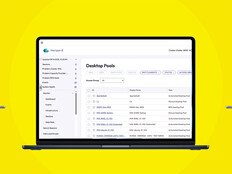Consider Key Criteria for Cloud Platforms
Choosing a cloud platform for your business can be complex, but working with a tech partner such as CDW can help. That said, here are some key factors all small businesses should consider:
1. Workload Requirements
Assess the specific workloads your business runs on, then determine which platform offers the most compatibility. For instance, if you have a wide range of applications and are looking to scale fast, AWS’ third-party integrations might be an attractive option.
2. Cost and Pricing Models
Compare the initial setup costs and ongoing expenses. AWS, Azure and GCP offer various pricing models, including pay-as-you-go plans and reserved instances. Small businesses can also work with CDW to identify potential discounts and commitment options. It’s worth noting that each platform has different pricing terms: AWS has its Enterprise Discount Program and Private Pricing Agreement plans, Azure calls its subscriptions maps, and GCP uses committed use discounts in its pricing model.
3. Marketplace Offerings
AWS Marketplace, Azure Marketplace and GCP Marketplace provide access to a wide range of third-party applications and services, so make sure the marketplace you’re subscribing to has the software your business needs.
4. Security and Compliance
AWS, Azure and GCP all offer comprehensive security features, but specific compliance requirements may vary, so IT leaders should weigh each platform’s data privacy options.
5. Support and Training
Small businesses may lack in-house customer service teams, so evaluating a cloud platform’s customer support plan is important. They feature a range of tiers, from basic to premium, and IT leaders should also consider training resources to upskill their teams as needed.
RELATED: These small business solutions and services can help your organization.
How CDW Can Help You Navigate the Marketplace?
Let’s walk through a real-life example of how choosing a cloud platform would work. Say your small business runs just $1 million in AWS workloads. But you also have $500,000 of software that you’re running as well. From the AWS team’s perspective, $1.5 million sounds better than $1 million, because the larger your commitment, the stronger your relationship with that cloud provider. CDW makes sure that the investment a small business is making is worth it and that the exchange is a two-way street.
Once a business selects a provider, CDW can manage that cloud spending on an incremental, annual basis. Often, pricing plans are use-it-or-lose-it, and we have some customers that are signed up for $5 million AWS plans. Now, say that same customer wants access to Cisco software through AWS Marketplace, so their IT leaders commit $1 million to this cloud platform. However, only two products it wants are available in the marketplace. If the customer proceeds, that’s $900,000 it is overcommitting, a big financial loss.
CDW does the legwork for the customer to verify that the software it needs is available. And if it isn’t, we redirect the customer to another marketplace that has the right products.
This article is part of BizTech's AgilITy blog series.












